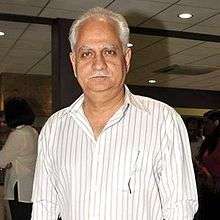Ramesh Sippy
Ramesh Sippy (born 23 January 1947) is an Indian film director and producer, best known for directing the popular and critically acclaimed film Sholay. He is a winner of the civilian honour of Padma Shri in 2013.[1]
Ramesh Sippy | |
|---|---|
 Sippy in 2012 | |
| Born | Ramesh Sipahimalani 23 January 1947 |
| Nationality | Indian |
| Occupation | Film director, producer |
| Spouse(s) | Kiran Juneja |
| Children | Sheena Sippy, Sonya Sippy, Rohan Sippy |
| Parent(s) | Gopaldas Parmanand Sippy |
| Honors | Padma Shri (2013) |
Sippy's father was producer G. P. Sippy. His son Rohan Sippy is a film director. His daughter Sheena was once married to Shashi Kapoor's son, Kunal Kapoor until they divorced in 2004.[2] Ramesh Sippy has been married twice; his current wife is actress Kiran Juneja. In the year 2017, he founded Ramesh Sippy Academy of Cinema & Entertainment in Mumbai.
Career
Ramesh Sippy visited the sets of the film Sazaa, his father's first film, when he was 6 years old. His first film job came at age nine, when he played Achala Sachdev's son in the 1953 film Shahenshah. He worked in both the production and direction departments in films like Johar-Mehmood in Goa and Mere Sanam, which his father was producing. He worked for 7 years as an assistant before becoming the director of Andaz, in 1971 which starred Shammi Kapoor, Hema Malini and Rajesh Khanna in lead roles and was a box office success. His second film Seeta Aur Geeta (1972), featuring Hema Malini playing dual roles was highly successful and propelled Malini to superstardom[3][4]
In 1975, he directed Sholay featuring an ensemble cast including Dharmendra, Amitabh Bachchan, Sanjeev Kumar and Amjad Khan in his most iconic role as the dacoit Gabbar Singh. After a lukewarm start the box office, the film went on to become the biggest blockbuster in Bollywood film history and won major acclaim. Sholay still remains one of the most iconic films in Hindi film history and a favourite for Hindi film audiences globally.[5]
None of his later films were able to match the success of Sholay.[6] While Sholay was a tribute to the Westerns, his next film Shaan in 1980 was inspired by the James Bond films but was only a moderate success.[7] In 1982, he brought together veteran actor Dilip Kumar and the reigning superstar Amitabh Bachchan in Shakti. While the film was only moderately successful, it won the Filmfare Best Movie Award. In 1985, he directed Saagar, which starred Rishi Kapoor, Kamal Hassan and marked Dimple Kapadia's comeback to films after 12 years since her debut film Bobby.
He directed a successful television serial titled Buniyaad which focused on the Partition of India and aired on Indian television channel Doordarshan in 1987. The last three films he directed, Bhrashtachar (1989), Akayla (1991), and Zamana Deewana (1995) were box office flops and he has since not directed any film, as of 2015.
His string of hits with Amitabh Bachchan made him one of the golden directors who had a special working relationship with the actor (Yash Chopra, Prakash Mehra, Manmohan Desai, and Hrishikesh Mukherjee being the other four). In 2005 he received the Filmfare Best Film of 50 Years award for his legendary film, Sholay.
He has produced films directed by his son Rohan Sippy, such as Kuch Naa Kaho (2003), Bluffmaster (2005) and Dum Maro Dum (2011). In 2006 he produced Taxi No. 9211 which was directed by Milan Luthria. In 2008 he produced Kunaal Roy Kapur's The President is Coming as well as the Akshay Kumar-Deepika Padukone film, Chandni Chowk to China, directed by Nikhil Advani.
Sippy's 1995 film Zamana Deewana was poorly received by audiences and critics, and led to the director abandoning film-making for almost 20 years. In 2015, he finished shooting his next film, Shimla Mirchi, a comedy film starring Rajkummar Rao, Rakul Preet Singh, and Hema Malini.[8] The film had difficulty attracting buyers as of July 2018, and has not been released.[9]
Awards and honours
- Filmfare Best Film of 50 Years for Sholay in 2005
- IIFA Award for outstanding contribution to the Indian cinema (Male) in 2012
- Padma Shri in 2013
- Filmfare Lifetime Achievement Award in 2020.
Filmography
Director
- Shimla Mirchi (2020)
- Zamana Deewana (1995)
- Akayla (1991)
- Bhrashtachar (1989)
- Buniyaad (1987) television drama-series
- Zameen (1987)
- Saagar (1985)
- Shakti (1982)
- Shaan (1980)
- Sholay (1975)
- Seeta Aur Geeta (1972)
- Andaz (1971)
Producer
- Sonali Cable (2014)
- Nautanki Saala (2013)
- Dum Maaro Dum (2011)
- Chandni Chowk to China (2009)
- Fear (2007)
- Taxi No. 9211 (2006)
- Bluffmaster! (2005)
- Kuch Naa Kaho (2003)
- Trishna (1978)
- Brahmachari (1968)
References
- "Padma Awards" (PDF). Ministry of Home Affairs, Government of India. 2015. Retrieved 21 July 2015.
- IMDb profile
- https://m.rediff.com/%0Amovies/2003/may/28dinesh.htm
- (Chopra 2000)
- http://www.bbc.com/culture/story/20150813-sholay-the-star-wars-of-bollywood
- https://www.khaleejtimes.com/wknd/bollywood/remembering-sholay
- https://www.cinestaan.com/articles/2017/may/16/5833/was-shaan-a-mistake-after-sholay-here-s-what-ramesh-sippy-has-to-say
- "Rajkummar Rao Wraps up Shoot For Shimla Mirchi – NDTV Movies". NDTVMovies.com. 12 May 2015. Retrieved 27 May 2018.
- "Ramesh Sippy's comeback film Shimla Mirchi starring Hema Malini has no buyers". deccanchronicle.com/. 28 March 2016. Retrieved 3 July 2018.
Sources
- Chopra, Anupama (2000). Sholay: The Making of a Classic. Penguin Books, India. ISBN 0-14-029970-X.